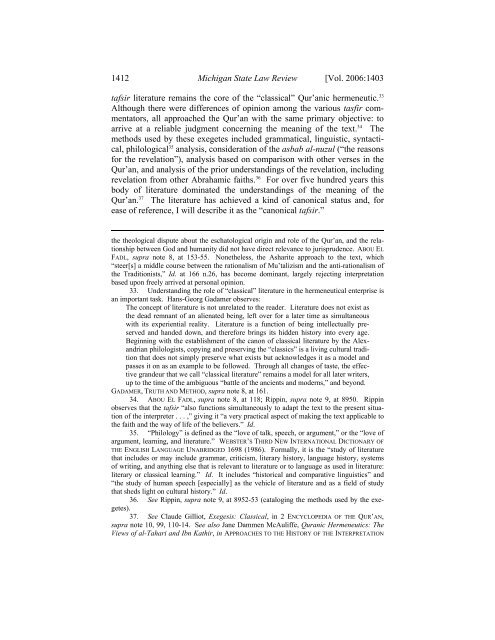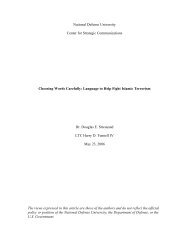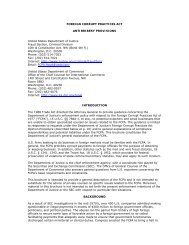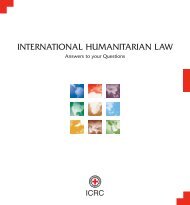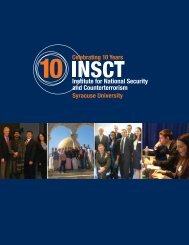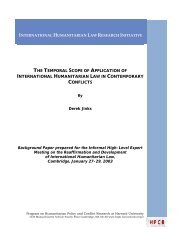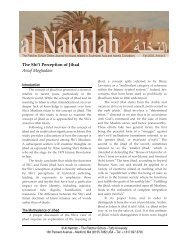some reflection on post-enlightenment qur'anic hermeneutics
some reflection on post-enlightenment qur'anic hermeneutics
some reflection on post-enlightenment qur'anic hermeneutics
Create successful ePaper yourself
Turn your PDF publications into a flip-book with our unique Google optimized e-Paper software.
1412 Michigan State Law Review [Vol. 2006:1403tafsir literature remains the core of the “classical” Qur’anic hermeneutic. 33Although there were differences of opini<strong>on</strong> am<strong>on</strong>g the various tasfir commentators,all approached the Qur’an with the same primary objective: toarrive at a reliable judgment c<strong>on</strong>cerning the meaning of the text. 34 Themethods used by these exegetes included grammatical, linguistic, syntactical,philological 35 analysis, c<strong>on</strong>siderati<strong>on</strong> of the asbab al-nuzul (“the reas<strong>on</strong>sfor the revelati<strong>on</strong>”), analysis based <strong>on</strong> comparis<strong>on</strong> with other verses in theQur’an, and analysis of the prior understandings of the revelati<strong>on</strong>, includingrevelati<strong>on</strong> from other Abrahamic faiths. 36 For over five hundred years thisbody of literature dominated the understandings of the meaning of theQur’an. 37 The literature has achieved a kind of can<strong>on</strong>ical status and, forease of reference, I will describe it as the “can<strong>on</strong>ical tafsir.”the theological dispute about the eschatological origin and role of the Qur’an, and the relati<strong>on</strong>shipbetween God and humanity did not have direct relevance to jurisprudence. ABOU ELFADL, supra note 8, at 153-55. N<strong>on</strong>etheless, the Asharite approach to the text, which“steer[s] a middle course between the rati<strong>on</strong>alism of Mu’talizism and the anti-rati<strong>on</strong>alism ofthe Traditi<strong>on</strong>ists,” Id. at 166 n.26, has become dominant, largely rejecting interpretati<strong>on</strong>based up<strong>on</strong> freely arrived at pers<strong>on</strong>al opini<strong>on</strong>.33. Understanding the role of “classical” literature in the hermeneutical enterprise isan important task. Hans-Georg Gadamer observes:The c<strong>on</strong>cept of literature is not unrelated to the reader. Literature does not exist asthe dead remnant of an alienated being, left over for a later time as simultaneouswith its experiential reality. Literature is a functi<strong>on</strong> of being intellectually preservedand handed down, and therefore brings its hidden history into every age.Beginning with the establishment of the can<strong>on</strong> of classical literature by the Alexandrianphilologists, copying and preserving the “classics” is a living cultural traditi<strong>on</strong>that does not simply preserve what exists but acknowledges it as a model andpasses it <strong>on</strong> as an example to be followed. Through all changes of taste, the effectivegrandeur that we call “classical literature” remains a model for all later writers,up to the time of the ambiguous “battle of the ancients and moderns,” and bey<strong>on</strong>d.GADAMER, TRUTH AND METHOD, supra note 8, at 161.34. ABOU EL FADL, supra note 8, at 118; Rippin, supra note 9, at 8950. Rippinobserves that the tafsir “also functi<strong>on</strong>s simultaneously to adapt the text to the present situati<strong>on</strong>of the interpreter . . . ,” giving it “a very practical aspect of making the text applicable tothe faith and the way of life of the believers.” Id.35. “Philology” is defined as the “love of talk, speech, or argument,” or the “love ofargument, learning, and literature.” WEBSTER’S THIRD NEW INTERNATIONAL DICTIONARY OFTHE ENGLISH LANGUAGE UNABRIDGED 1698 (1986). Formally, it is the “study of literaturethat includes or may include grammar, criticism, literary history, language history, systemsof writing, and anything else that is relevant to literature or to language as used in literature:literary or classical learning.” Id. It includes “historical and comparative linguistics” and“the study of human speech [especially] as the vehicle of literature and as a field of studythat sheds light <strong>on</strong> cultural history.” Id.36. See Rippin, supra note 9, at 8952-53 (cataloging the methods used by the exegetes).37. See Claude Gilliot, Exegesis: Classical, in 2 ENCYCLOPEDIA OF THE QUR’AN,supra note 10, 99, 110-14. See also Jane Dammen McAuliffe, Quranic Hermeneutics: TheViews of al-Tahari and Ibn Kathir, in APPROACHES TO THE HISTORY OF THE INTERPRETATION


